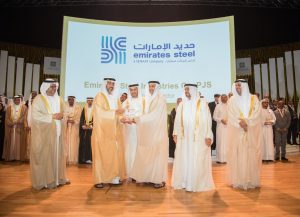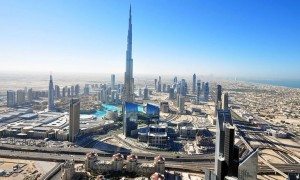Revolving doors
Fluctuations in demand and the cost of raw materials have led windows and doors suppliers to reassess operations. Here, four companies reveal how they’re staying ahead of the trends

Which sectors are looking particularly strong and how has the business adapted in response?
Phillip May: About 85% of our work is now in the corporate sector, up from 50% 18 months ago with the remaining split pretty equally between retail, hotel and residential. Residential particularly seemed to be financed rather shakily along with government projects, however, through our focus on the high end of the market we have been able to tap into the blue-chip clients looking to fit out new office space. These companies are far more disciplined financially, and only undertake to build an office if they have secured and allocated funds to do so.
Ayman Odeh: In terms of business we cannot discount any specific market and find it is good practice to target all sectors of the construction industry.
Hilal Ismail: Our strongest area at the moment is in hospitality, particularly hotels. In response we are trying to focus our operations on this sector.
Ben Shaw: Throughout the GCC, Middle East and North Africa, most sectors are looking healthy particularly infrastructure activities. As for the countries, obviously there is a change on geographical performance with the decline in Dubai, but countries like KSA, Qatar, Kuwait and Egypt in particular seem to have handled the storm pretty well and are still active.
How has the decline in residential construction affected your output and contracts?
PM: It hasn’t really as we were a young company with a low turnover when the crash happened and therefore were able to refocus our sales efforts quickly without much of a short-term impact on our turnover.
AO: We were not affected; we focused more on other contracts requiring access doors and fire resistance doors. For example commercial buildings, hospitals, the retail sector, hotels, jails, police stations etc.
HI: Our output and contracts are down 30% compared to last year. We have found that there are too many contractors and fewer projects.
BS: Our residential sector did decline but is increasing again due to activities in the wider GCC. Hopefully in Dubai we’ll see a return to growth, but we don’t see much happening for at least another two to three years. Nevertheless, Abu Dhabi is still strong.
Have you identified the emergence of any positive trends?
PM: As the business is young, our year-on- year growth doesn’t reflect the market. Our supply chain from within the UAE has improved dramatically in terms of service, lead times and pricing, as our suppliers have been looking for work. In the corporate market, the most positive development we’ve seen is a new demand for quality, with end users insisting on something that is going to last a long time, reflect their corporate image and achieve the required levels of safety and sound insulation standards as required within Europe and North America. This has been good news for us as we are one of the few companies that can offer independently proven acoustics, long-term performance guarantees, point load tests etc. This has given us an edge recently over the cheaper options that were always chosen in the past.
AO: We always plan to expand, as steel interior and exterior design has no limits. To achieve this we forge strong customer-supplier relations which provide a new role for steel mills with desirable business strategies in the supply chain of automotive steel sheets. After a collapse in steel demand last year amid the global economic crisis, we had to increase production and keep in contact with longer-term clients. However, as per present indications, steel demand is forecast to rise about 10% this year.
HI: The most positive trend we have noticed is the increase in demand from Abu Dhabi and, of course, the Saudi Arabian market, where there is a lot of opportunity at the moment across
a number of projects and markets. We started to see this pattern emerging around mid-2009.
BS: All Gulf countries and many areas across the Middle East and North Africa will show GDP growth in 2010. Providing we don’t see another recession in the more developed parts of the world, this should continue to accelerate in 2011.
How have price fluctuations for raw materials been addressed?
PM: We haven’t had any issues on this point. Our prices have remained constant with regards to the aluminium and steel components. I assume that this is because suppliers at the moment are concerned about passing any increases on for fear of losing business.
AO: Steel has been affected and manufacturers worldwide have a hard time judging raw material costs. Changing prices can greatly endanger the company’s success and inventory management is one solution to help deal with price fluctuations. Prometal always provides efficient price management that works for clients, whatever the state of the materials market.
HI: We have noticed increases in the price of steel and aluminium and unfortunately this is something we have had to factor into our costs. However, generally we have found that the cheaper materials are the most popular and have had to find new suppliers to meet these demands. Additionally, our clients have been expecting prices to rise and they will have to cover part of these costs.
BS: We do look at these influences on a regular basis. We fix our prices every year, but if the increase is really significant then we have to pass some of that onto customers. Similarly, if prices drop we adjust costs accordingly and the same goes for currency fluctuations.
Has the company experienced any issues with skills bases in the manufacturing process?
PM: All products are delivered to us in component form and we cut and fit onsite, so we don’t manufacture. However, we have found that it has been easier for us to recruit good staff during the downturn as there are so many companies that are letting people go who have good UAE experience. We also don’t have the traditional issues that employers face here in the UAE regarding mobility of labour.
AO: We haven’t experienced any issues with our skills base. We employ very highly-skilled engineers and provide continuous supervision and training for all the departments, which clarifies any upcoming issues. Prometal provides a special three-month training programme for all new employees so they are very well educated and experienced in the field, to eliminate process and manufacturing issues.
HI: We haven’t experienced any issues at all so far.
BS: We have manufacturing bases all over the world and we’re able to exchange those skills in a very efficient manner so we don’t experience any particular issues.
Many contemporary buildings favour modern rather than traditional Arabic designs. What recent trends have you witnessed?
PM: Modern designs have been prevalent since we set up. We have found our primary design factors at the moment are acoustics and, more commonly, the use of sustainable materials to increase LEED ratings. I don’t predict the demands changing anytime soon regarding the type of work we do, as we tend to work with western designers, working with western multinationals.
AO: Our products adjust to most of the design concepts, even if there are changes with the architectural style. For example we are flexible with the finishes of our doors through colour and material appearance.
HI: For our clients, we have found that pricing is key, but the design of adjacent buildings plays a big factor also. We don’t predict any reverting back to traditional styles.
BS: Although the majority of designs are relatively contemporary, I think there is an increasing demand for traditional architectural style here and there. From a creative point of view, contemporary gives the architects and designers a lot more chance to express themselves.
In terms of product development, is there still scope to invest in new products and is there a strong enough demand for these?
PM: While we are not currently developing new products, we are introducing products from Europe that are new to this market in our line of work. These are going down very well as architects are keen to source new products. However, if this required heavy investment on our part I am not sure it would be commercially viable. We would probably wait until the market is more buoyant than at present.
AO: There is scope to invest and our design, fabricating and products are periodically audited and updated as per the very latest industrial and architectural developments. Prometal’s project leaders select their team members, architects and design engineers carefully and continuously update their steel works scope, investing in a variety of new products and fit-out works as per environmental and technological updates. Beyond our steel and metal works, we often work with our clients and provide design ideas in order to meet their specific requirements.
HI: At this point, investing in new product development has been put on hold for now, yet we do expect further investment in the next three months.
BS: We have a new product called CS80 Magneo which uses a magnetic levitation system, let’s say an internal sliding door operator. It is available now and is popular in residential, office, hotel and infrastructure buildings.





